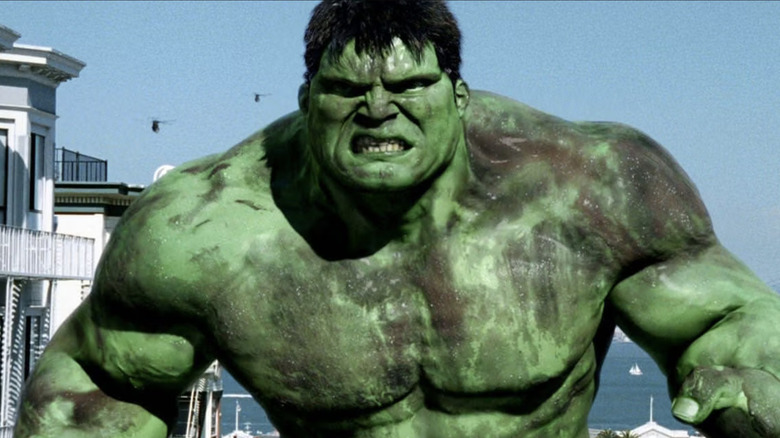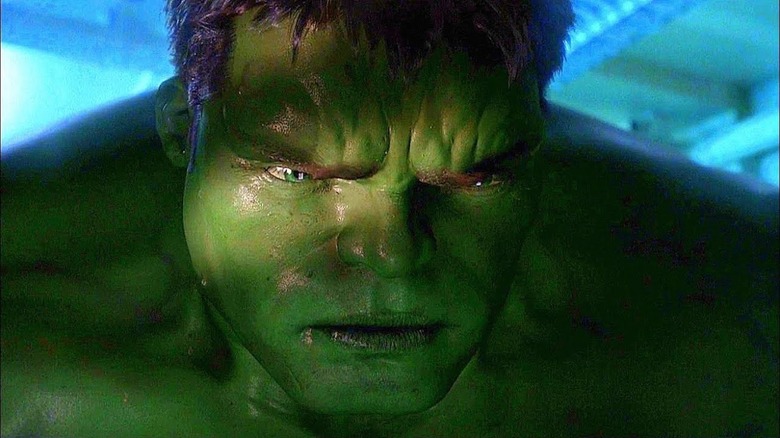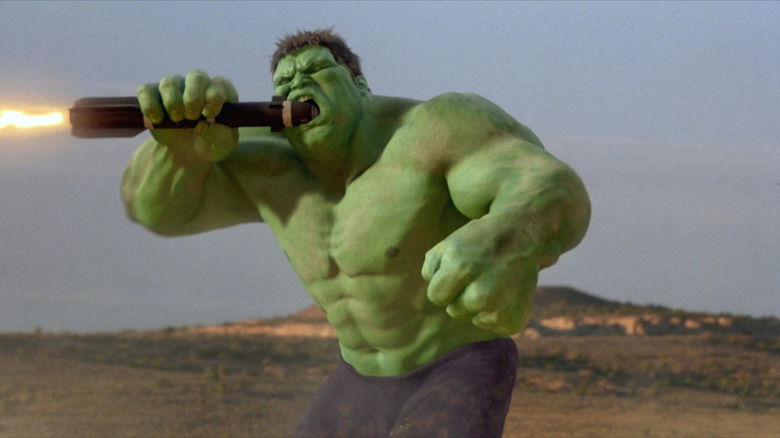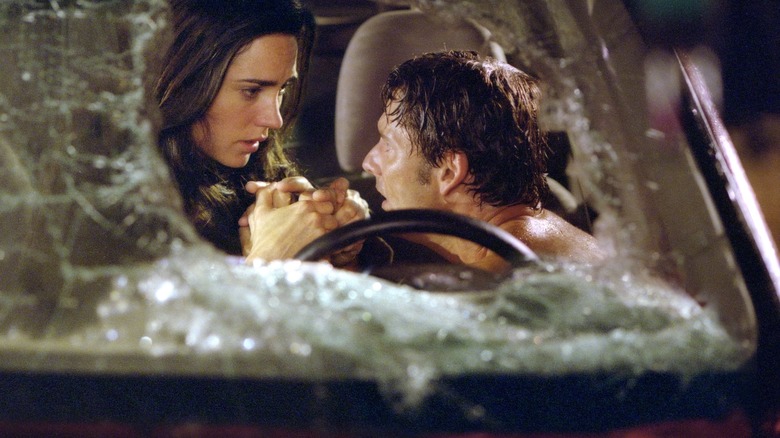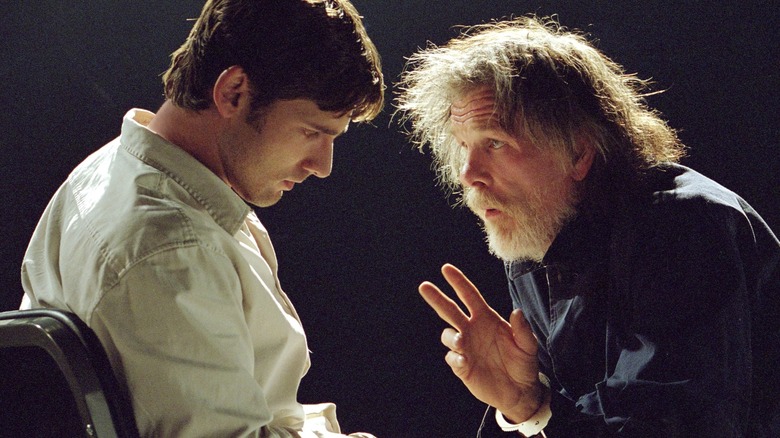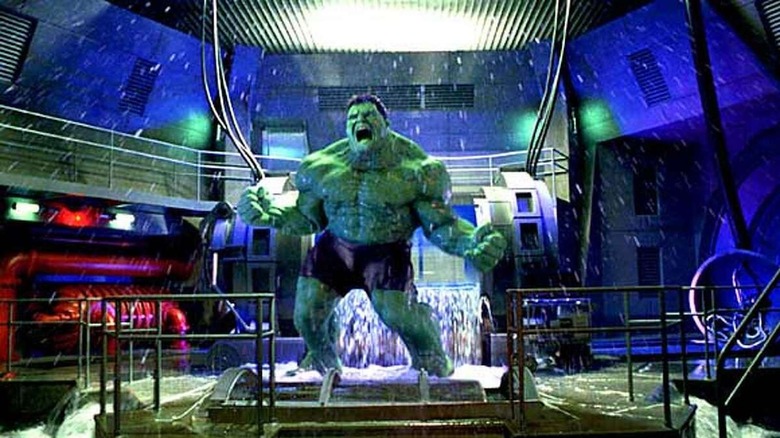20 Years Later, Ang Lee's Hulk Is A Misunderstood Triumph Of Superhero Cinema
June 13, 2007 was hardly time for Marvel Studios to be taking a victory lap. Despite a record $151 million opening weekend, Sam Raimi's "Spider-Man 3" was on pace to become the lowest-grossing film in the series. Mixed reviews and a clear sense of creative apathy on the director's behalf augured poorly for a fourth installment. This came on the heels of the apparent death of Fox's X-Men franchise — which Bryan Singer had abandoned to make the strangely sullen and, it turned out, unwanted "Superman Returns" — at the cloddish hands of Brett Ratner.
Marvel's other two Fox-distributed properties, "Daredevil" and "Fantastic Four," were either buried or terminal. "Blade" had run its course at New Line, "The Punisher" made Artisan about as much money as a Punisher movie will ever make for anyone, Sony's "Ghost Rider" self-immolated by hiring the hack who bodied "Daredevil," and here's where I remind you Brett "The Lawnmower Man" Leonard directed a "Man-Thing" adaptation.
Yet here I was, seated in a gargantuan Playa Vista, California hangar-turned-soundstage that once housed Howard Hughes' fabled aeronautical folly "Spruce Goose," with a bunch of webmasters from a bunch of "geek-friendly" websites — which, for the most part, only exist on the Wayback Machine nowadays — lobbing questions at Marvel's newly appointed head of production, Kevin Feige. And, boy, was he chesty.
The occasion was a set visit for Jon Favreau's forthcoming "Iron Man," which, judging from the swanky decor of Tony Stark's Malibu bachelor pad, at least had the space-age aesthetic down pat. After receiving the grand tour of the premises, a Paramount publicist sat us down for a press conference that played like the feeling-out first round of a heavyweight fight.
Previously, Feige had hung out in the background as former Marvel Entertainment honcho Avi Arad's number two, but now he was the man. Could we trust him? Did he care if we did? For most of the gathered fanboys journalists, he earned their loyalty by trashing Marvel's most stirringly singular movie to date.
Get lost, Ang Lee! We've got Louis Leterrier!
In 2007, the audience for "Iron Man" was split into two camps: 1) comic book readers who were eager for an adaptation that combined the artistry of (to name a few) Don Heck, Bob Layton, and Mark Bright with the boozy, playboy jovialness that would eventually land Tony Stark on the skids, and 2) normal people who just wanted to see a movie that didn't suck.
Aside from the gorgeous sets and a hyper-charismatic how-do-you-do from Jon Favreau and Robert Downey Jr. (then an online fave thanks to Shane Black's "Kiss Kiss, Bang Bang"), Kevin Feige didn't have much to show us. His only play was to speak fluent geek. So he opened all the way up and invited us to ask anything about any Marvel Comics property that might conceivably be in development. After scowling at my suggestion of Larry Clark's "Power Pack," one of my colleagues asked about Louis Leterrier's "The Incredible Hulk" and how it would be different from Ang Lee's 2003 "Hulk."
Feige brightened. Though there were concerns at the time about the notoriously headstrong Edward Norton clashing with an empty-calorie action guy like Letterier (who'd just directed "Transporter 2"), Feige waved off all doubts by reassuring us all was in hand. "[The Incredible Hulk] will be different from the first one because this one will be good," he said.
Laughter and applause ensued, but I could only gasp at Feige's chutzpah. I understood "Hulk" was a big auteurist swing that baffled mainstream moviegoers, but for a just-promoted exec to brazenly trash a world-class filmmaker like Lee sent a chilling message. No more visionaries. From now on, we color inside the lines at Marvel.
Feige's instincts proved impeccable, but his insistence on a homogenized house style hastened the death of big-canvas Hollywood risk-taking. And studio movies generally haven't been the same since.
The journey from development hell to pulp-art heaven
Getting "Hulk" before cameras was a labor largely devoid of love. Development on the film began in 1990 with producers Avi Arad and Gale Anne Hurd commissioning drafts by screenwriters such as Michael France, John Turman, and Zak Penn. A select contingent of comic book fans swooned when Joe Johnston, the VFX pioneer who'd helmed the exhilarating Golden Age yarn "The Rocketeer," climbed aboard to direct, but he bolted for the far less complex (yet sadly unsuccessful) "October Sky," at which point the producers started throwing more writers at the project.
Having struck out in Hollywood with two superb films ("The Ice Storm" and "Ride with the Devil") that failed to garner a single Academy Award nomination, Ang Lee scored an unlikely blockbuster in the wuxia epic "Crouching Tiger, Hidden Dragon." Suddenly, an American awards body that had long treated martial arts films as grindhouse trash saw artistic merit, at which point the sealed-shut studio doors once again flew open for Lee.
"Hulk" beckoned, and Lee seized the opportunity with his frequent collaborator James Schamus attached to rewrite a script that had most heavily been worked on by France and Turman. (Indeed, the WGA awarded them "written by" credit.) Amazingly, for a studio project that had languished in development hell for over a decade, Lee's finished film is bracingly personal and tonally unified. Shot for shot, cut for cut, this is Ang Lee suffusing the comic book movie with his own pulp kinks. It is a grand, mega-budget entertainment that, VFX-wise, might've been a few years ahead of its time, but these limitations are where our imaginations fill the gap. It is a film of artistic and technical ingenuity that asks you to dream along with it.
From a whisper to Hulk Smash!
Ang Lee's "Hulk" pays fans the highest degree of respect by avoiding Easter eggs whenever possible — I assume the Stan Lee/Lou Ferrigno cameo in the first act was non-negotiable. Instead, it overwhelms their senses with a split-screen editorial style — executed alongside the great Tim Squyres — that dynamically replicates the experience of reading a comic book. (Though I'd like to think that Lee was inspired in part by the "Spider-Man" segments from the Children Television Workshop's "The Electric Company.") Meanwhile, Lee and cinematographer Frederick Elmes paint each frame with a master colorist's eye, gently emphasizing greens and purples to keep the tragedy of Bruce Banner's unexamined life in mind even when he's not fully aware of his past.
Bruce Banner (Eric Bana) doesn't even know he's Banner, nor does he realize he's engaged in an ill-fated romance with the daughter of his father's sworn enemy. The first act of Lee's movie is a hushed journey of self-discovery, literally. Aside from the gamma-radiated pyrotechnics, "Hulk" is a tale of repressed desire, not unlike "The Ice Storm" or "Sense and Sensibility." Most of the dialogue is delivered sotto voce because Bruce, Betty Ross (Jennifer Connelly), David Banner (Nick Nolte), and even Thunderbolt Ross (Sam Elliott) either sense or flat-out know the irreparable toll of emotional histrionics. Mustn't speak too loud, now. Hulk sleeping.
The Incredible Hulk cometh
The physical toll doesn't fully emerge until Bruce, immersed in a water chamber like a fetus in an amniotic sac (so that his genetic fury can be mined for the military-industrial complex's gain), realizes his father David killed his birth mother. The pieces click together, and, suddenly, everyone who's sought to weaponize Bruce's brilliance/anger/sorrow has a big green problem on their hands. And that's when Lee gives us the blockbuster goods. Though VFX maestro Dennis Muren's Hulk isn't always photoreal, he's as ecstatically believable in the context of the action as Willis O'Brien's King Kong (and just as much fun). Whether he's hammer-throwing a tank or slapping a steel turret into the palm of his hand like a mob bruiser wielding a shillelagh, Muren's Hulk is dripping with character.
One legitimate criticism leveled at Lee's film holds that Eric Bana, by design, isn't allowed to give an entire performance as Bruce. Once he gets mad, we get the Hulk. Bana was evidently frustrated by this, and it's understandable why. But that's a built-in flaw with Bruce's origin story, especially as reconfigured here. Banner can't break the shackles of his arrested development until he makes peace with the existence of the abuse-induced monster within.
Bruce accomplishes this in his highly charged final showdown with David, which is lit and staged like an experimental SoHo revival of Eugene O'Neill's "Long Day's Journey into Night." Again, Bana is forced to play emotional second fiddle to Nick Nolte, who views Bruce as "a flimsy husk of consciousness just waiting to be torn off." Here, at last, is the true monster of "Hulk:" a father whose masterpiece is a malignant offspring, a molecular miracle of hate.
Imagine letting Anthony Hopkins' Odin play these notes.
An era of puny tentpoles
Ang Lee's "Hulk" briefly held the record for the biggest June opening weekend of all time, and nearly made history with its 60% second-weekend plunge. At the time, this felt like the best outcome for all involved: Lee wouldn't have to bother with a sequel on any level, leaving him to make meaningful adult dramas like "Brokeback Mountain" and "Lust, Caution." But the tech bug bit him somewhere down the line, and I'm not sure helming a high-frame-rate showcase like "Gemini Man" is where I'd prefer the man who made one of my favorite movies of all time to be. ("Ride with the Devil," ever-so-briefly featuring the current Hulk, Mark Ruffalo.)
Still, at least he's pushing the outside of the filmmaking envelope on some level. There are bonafide geniuses working in the studio tentpole field today (e.g. James Cameron, Christopher Nolan, and Joseph Kosinski), but they've bought themselves failure insurance either via a decade-plus of hits or by aligning themselves with a movie star who unofficially runs Paramount. Meanwhile, unique talents like Barry Jenkins, Sarah Polley, and Chloe Zhao are relegated to the cookie-cutter blockbuster business ("Mufasa: The Lion King," "Bambi," and "Eternals" respectively). They'll never get the creative leeway granted to Lee on "Hulk" because some executive might lose their job if they accidentally make a not-entirely-formulaic work of art.
Kevin Feige has every excuse to treat his films as a safe, visually indistinct product. But if he had the guts of his go-for-broke predecessors, he'd lay a heavy bet and let it ride once in a while. Because I'd take Ang Lee's "Hulk" over the rest of his filmography. Managed risk is for cowards, especially when you're wealthy with house money several times over. There's integrity in failure. Go make a "Heaven's Gate." Get yourself fired. Losing is where art, and greatness, happen.
"Hulk" is currently streaming on Tubi (for free with ads) and on Peacock (without ads, but you need a subscription).
